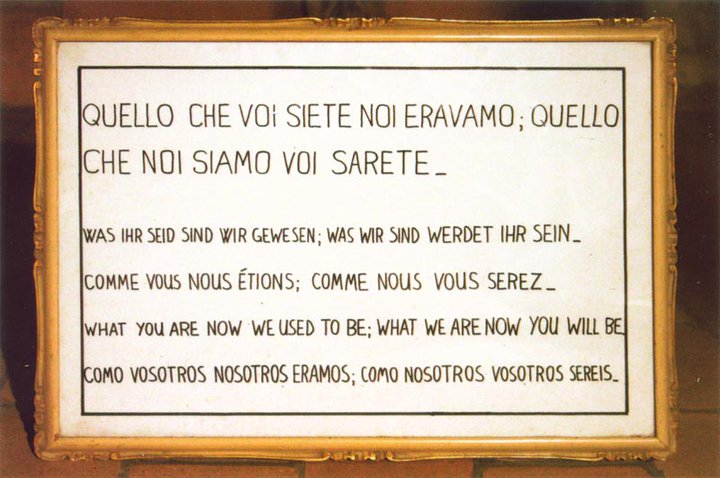Psychology of Time: What is Your Time Perspective?
It really is amazing how traveling can change your perspective on certain things. One of the most memorable trips I have taken was back in 2011 when I visited Rome, Italy with a good friend.
While there were many memorable parts of that trip, there was one in particular that really changed my perspective on time forever.
In the center of Rome beneath the church of Santa Maria della Concezione dei Cappuccini lies what is known as the Capuchin Crypt or the Museum and Crypt of the Capuchin Friars. Basically, it contains six little rooms made up of the bones of 4,000 monks which are fastened to the walls in various patterns, piled high on top of others and hanging from the ceiling as light fixtures. While it is shocking and jolting, it is at the same time a silent reminder of both how quickly time passes and of our own mortality.
The real jolt, which we will get to in a bit, came when we passed through the last little room. I was reminded of this part of my life recently when I read an interesting book on the psychology of time called The Time Paradox: The New Psychology of Time That Will Change Your Life.

The authors, Philip Zimbardo and John Boyd have drawn upon their 30 years of research to show how your perspective on time and the psychology of time affect the decisions that you make. While the book was a bit dense and written in an academic style, it was extremely helpful and has impacted how I view not only myself but others.
Our Attitudes Toward Time…
…can have an enormous impact on our lives, and yet we don’t even know it. While many of us realize that time is our most valuable resource, it’s amazing how little thought we give to how we use it.
Think about it, many of us do a cost-benefit analysis before we spend money, yet we are not even close to as deliberate in thinking about how we spend our time.
So…the idea is to leverage the psychology of time and identify your which of the 5 time perspectives outlined by the authors applies most to you.
Then, understand how it affects your thoughts, feelings, and actions.
Finally, you can use some of their suggestions to make the most of your precious time.
Before we get to the 5 different time perspectives and what we can do to improve them, let’s first define the concept of time perspective.
In His TED Talk…
Zimbardo defined it as follows: “The study of how individuals divide the flow of human experience into different time frames or time zones-automatically and non-consciously.” He went on to add that time perspectives vary between social classes, cultures, countries, and people.
When We Make a Decision…
The psychology of time and how we perceive time has a huge impact on the decision that we make.
For some of us…
 It’s all about what is happening at the moment, we are present-oriented and focused on the now.
It’s all about what is happening at the moment, we are present-oriented and focused on the now.
For others…
 The present is irrelevant, we make our decisions based upon what happened in the past. Our past memories and experiences help us make our decisions, we are past-oriented.
The present is irrelevant, we make our decisions based upon what happened in the past. Our past memories and experiences help us make our decisions, we are past-oriented.
And for the rest of us…
 Both the past and the present are irrelevant, what we care about is the future. We do a cost-benefit analysis and look at anticipated consequences, we are future-oriented.
Both the past and the present are irrelevant, what we care about is the future. We do a cost-benefit analysis and look at anticipated consequences, we are future-oriented.
Let’s now do a bit deeper dive into…
The 5 Time Perspective Factors
According to the authors, we all have different attitudes toward time and are affected by the psychology of time differently. Each of their 5 time perspectives reveals our attitudes, beliefs, and values towards time. They reveal whether we spend more time thinking about the past, present or future. They also reveal whether our thoughts are happy/sad, positive/negative, hopeful/fearful and they reflect our feelings, thoughts, and behaviors.
While the 5 are theoretically unrelated (your score on 1 factor is unrelated to your score on others), the authors have found consistent patterns in individual time perspective profiles.
To find your score you can take the test at http://www.thetimeparadox.com. It takes less than 10 minutes to complete. The thing to remember is that we can be high on multiple time perspectives and your score is comprised of all 5 which vary across a continuum from low to high. Each of the 5 has positive and negative aspects that again, in the interest of time, we won’t get into.
The authors break down time perspectives into 5 factors (2 past, 2 present and 1 future) that I will briefly describe:
(1) Past Positive
You have a positive attitude toward the past and remain very close to your family. Your positive attitudes towards the past help you make the best of tough situations and you often recall the positive aspects of difficult past events. The only downside is that you are sometimes a little too cautious and your ‘better safe than sorry’ ways can cost you opportunities.
(2) Past Negative
You are focused on negative past experiences that are still able to upset you. This can leave you feeling bitter and angry. Often, you don’t remember things that happened correctly.
(3) Present Hedonistic
You are all about living in the present in terms of finding things that yield pleasure while avoiding pain. You actively seek pleasure, focusing on instant gratification, short-term payoffs and have a hard time postponing feeling good now for future gain which can lead to an unhealthy lifestyle.
(4) Present Fatalistic
You believe that your life is predetermined and controlled by forces that you are unable to influence. Your actions do not produce or influence the outcomes that you want which creates resignation and cynicism.
(5) Future-oriented
You are ambitious and focused on reaching your goals and weigh the benefits of instant gratification against future costs. Sometimes your investment in the future can cost you relationships and fun times.
Again, we can score high on multiple perspectives, and each of them is a continuum from low to high. That being said, the idea is to have…
A Balanced Time Perspective
According to the authors, it is best to have a balanced time zone rather than one that is narrowly focused. The idea is to stop over-indulging in the present and obsessing over the past and future. This understanding of the psychology of time will allow you to have the mental flexibility to shift your perspective fluidly depending on the demands of the situation – from past to present to future.
The Optimal Profile…
…is one that helps you learn from the past, enjoy the present and plan for the future. So, depending on the situation you are involved in, one of the perspectives may jump to the forefront while the others sit in the background.
They believe the optimum profile looks like this:
High on past-positive which gives you roots, grounds you and connects you with family and traditions.
Moderately high on future which gives you wings to soar to new challenges and destinations while envisioning a bright and optimistic future.
Moderate in present-hedonism which allows you to live in the moment while giving you energy, the joy to experience different people, places and things – in moderation.
Low in past-negative as nothing good comes out of it.
Low in present-fatalism as nothing good comes out of it either.
I know we are running out of time, so let’s quickly discuss…
A Few Ways to Reset Your Time Perspective Clock
The authors suggest some ways to reset your time perspective clock:
If you are too Future-Focused:
 Figure out how to do less, not more!
Figure out how to do less, not more!
 Say no to reduce your obligations and commitments.
Say no to reduce your obligations and commitments.
 Learn to disconnect and take some time for yourself.
Learn to disconnect and take some time for yourself.
If you are too Present Hedonistic-Focused:
 Being too present focused can cause you to take unnecessary risks. The idea here is to shoot for moderation. The authors suggest you “Embrace periods of boredom as times to look within and create new fantasies and imagine scenarios of possible roles you might play in the future drama of your life.” 2
Being too present focused can cause you to take unnecessary risks. The idea here is to shoot for moderation. The authors suggest you “Embrace periods of boredom as times to look within and create new fantasies and imagine scenarios of possible roles you might play in the future drama of your life.” 2
If you are too Past Negative-Focused:
 Try to reconstruct negative experiences from the past and either neutralize them or find something positive in them.
Try to reconstruct negative experiences from the past and either neutralize them or find something positive in them.
To become more Future-Oriented:
 Set daily, weekly, monthly goals and keep tabs on them.
Set daily, weekly, monthly goals and keep tabs on them.
 Practice visualization and extend your visualization to the future.
Practice visualization and extend your visualization to the future.
 Make to-do-lists.
Make to-do-lists.
 Work toward bigger goals rather than short-term goals.
Work toward bigger goals rather than short-term goals.
To become more Present-Oriented:
 Practice meditation, relaxation exercises, and yoga.
Practice meditation, relaxation exercises, and yoga.
 Be spontaneous, take a weekend day and do whatever when that day arrives.
Be spontaneous, take a weekend day and do whatever when that day arrives.
 Try a new restaurant, go for a walk, drink some alcohol (in moderation!), say yes to invitations.
Try a new restaurant, go for a walk, drink some alcohol (in moderation!), say yes to invitations.
To become more Past-Oriented:
 Go through photo albums and yearbooks.
Go through photo albums and yearbooks.
 Plan family get-togethers and reunions.
Plan family get-togethers and reunions.
 Go back to your hometown.
Go back to your hometown.
Back to the Jolt…
…that I received when walking through the last room in the Capuchin Crypt.
I looked down on the floor and what I saw was a reminder.
And it wasn’t just any reminder.
It was a solemn reminder which completely stripped me of my ability to deny the inevitable truth that we are all prone to ignore.
Which is that our time on this planet is limited…

I hope your reading this blog post was time well spent.
Until next time…use the psychology of time to improve your life and as always…PYMFP!
–Rick
P.S. When I took the test I scored the following (ideal is in parentheses:
Past-negative 1.0 (ideal = 2.1)
Past-positive 4.33 (ideal = 3.67)
Present-fatalistic 1.00 (ideal = 1.67)
Present-hedonistic 2.93 (ideal = 4.33)
Future 4.92 (ideal = 3.69)
How about you?
Use it or Lose It – Psychology of Time
The idea is to have a balanced time zone rather than one that is narrowly focused. The idea is to stop over-indulging in the present and obsessing over the past and future. This will allow you to have the mental flexibility to shift your perspective fluidly depending on the demands of the situation – from past to present to future.
When to Use It:
When making decisions in your life.
What Do You Think?
Do you find you have a balanced time zone or do you have a more narrowly focused time zone? Please discuss your thoughts in the comments below!
If you enjoyed this post, it would mean the world to us if you shared it with people you care about via any of the social media platforms below!
Popular Previous Posts:
Managing Yourself: Advice from the Great Peter Drucker
How Many of These 5 Essential Questions Do You Ask?
3 Quick Ways to Become a Talent Magnet!
So, Do You Have a Fixed or Growth Mindset?
References
1https://www.ted.com/talks/philip_zimbardo_prescribes_a_healthy_take_on_time/discussion#t-138877
2 Zimbardo, P., & Boyd, J. (2008). The time paradox: The new psychology of time that will change your life. New York, NY, US: Free Press.


Hi Rick. Just for fun, I took the time test, with these results. I have absolutely no idea of how it stacks up or what it means. I suppose that I scored somewhere between ‘average’ and ‘needs to have a lobotomy’.
Time Perspective
Past-negative: 2.60
Past-positive: 4.78
Present-fatalistic: 2.22
Present-hedonistic: 3.13
Future: 3.54
One’s concept of the passage of time varies. As a kid, time progresses slowly, probably because past memories are few and future anticipation is high. The school year dragged on and on with anticipation of summer. Of courrse summer ended way too quickly. Then the cycle repeats for another 12 years. You remember the high points of summer – the beach, making out with that cute blonde, road trips to new locations, the first time you puked all over your shoes. The school portion of a year becomes just one big blank screen. Selective retention at its best.
The older you get, the quicker time passes. Of course it’s just your brain playing tricks on you. Major events take priority in your memory. Seems like only last week that I drove over to SF the day after my grand daughter was born. And now she’s romping and frolicking, plus can’t stop talking. Important highlights, milestone accomplishments, or some activity out of the ordinary remain locked in your memory, the day to day drudgery and routine do not even rate an overnight recollection.
Time Passages, by Al Stewart 1978
It was late in December, the sky turned to snow
All round the day was going down slow
Night like a river beginning to flow
I felt the beat of my mind go
Drifting into time passages
Years go falling in the fading light
Time passages
Buy me a ticket on the last train home tonight
Well I’m not the kind to live in the past
The years run too short and the days too fast
The things you lean on are the things that don’t last
Well it’s just now and then my line gets cast into these
Time passages
There’s something back here that you left behind
Oh time passages
Buy me a ticket on the last train home tonight
Hear the echoes and feel yourself starting to turn
Don’t know why you should feel
That there’s something to learn
It’s just a game that you play
Hey Dave, thanks for the great comments. Agreed, when you are a kid the summer seems to go on forever and as you get older it seems to fly by! Love the poem, thanks for sharing.
Very cool that you took the test. As for what they mean, they give an ideal for each time perspective on the results page, they are as follows:
Past-negative: 2.1
Past-positive: 3.67
Present-fatalism: 1.67
Present-hedonism: 4.33
Future: 3.69
Long story short, you have a very well balanced time perspective, which is great.
Talk soon, Rick